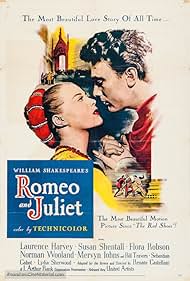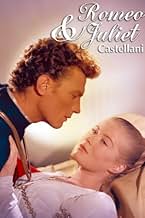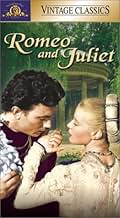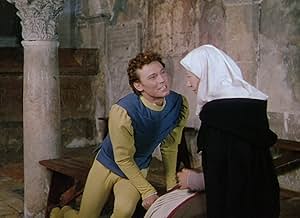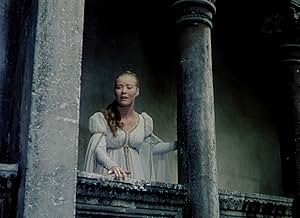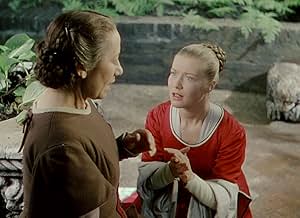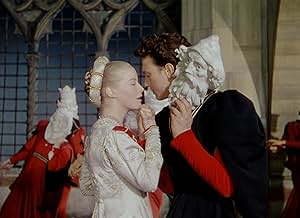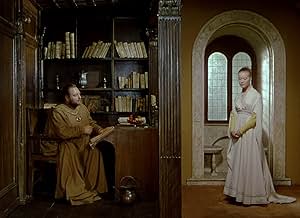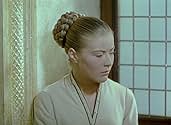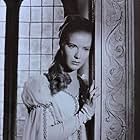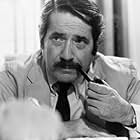IMDb-BEWERTUNG
6,0/10
667
IHRE BEWERTUNG
Die Montagues und Capulets, zwei Familien der italienischen Renaissance, hassen sich seit Jahren, aber der Sohn der einen Familie und die Tochter der anderen verlieben sich unsterblich inein... Alles lesenDie Montagues und Capulets, zwei Familien der italienischen Renaissance, hassen sich seit Jahren, aber der Sohn der einen Familie und die Tochter der anderen verlieben sich unsterblich ineinander und heiraten heimlich.Die Montagues und Capulets, zwei Familien der italienischen Renaissance, hassen sich seit Jahren, aber der Sohn der einen Familie und die Tochter der anderen verlieben sich unsterblich ineinander und heiraten heimlich.
- Regie
- Drehbuch
- Hauptbesetzung
- Nominiert für 3 BAFTA Awards
- 6 Gewinne & 6 Nominierungen insgesamt
Ennio Flaiano
- Prince of Verona
- (as Giovanni Rota)
Thomas Nicholls
- Brother Giovanni
- (as Tom Nicholls)
Empfohlene Bewertungen
This film version created by Renato Castellani is a beauty to behold.
In the picturesque settings of Siena, Padova, Verona and Venice, this romantic tale unfolds in glorious color.
While the character interpretations may appeal to a select number, I appreciate the total concept and the carrying out of that objective.
"Romeo" takes on a stylistic life of its own through Castellani, and for those willing to go on his journey, the rewards are great.
Mr. Harvey is interesting to see in an early role. As always, his work is very well thought out, and the aloofness which made him so right for callous young men in later modern roles, is intriguing here. Romeo now has a tinge of egotism and even femininity.
Well, why not? As there are dozens of ways to read a line, so there are many approaches to a character. There's nothing inherently sacrosanct in the role of Romeo, and Harvey interprets the way he (and Castellani) sees him, rather than according to some staid traditional model.
It's hard to believe this lovely production has not yet been transferred to video. Surely one day some enterprising company will take on this project and help preserve a very beautiful production for future generations to enjoy.
In the picturesque settings of Siena, Padova, Verona and Venice, this romantic tale unfolds in glorious color.
While the character interpretations may appeal to a select number, I appreciate the total concept and the carrying out of that objective.
"Romeo" takes on a stylistic life of its own through Castellani, and for those willing to go on his journey, the rewards are great.
Mr. Harvey is interesting to see in an early role. As always, his work is very well thought out, and the aloofness which made him so right for callous young men in later modern roles, is intriguing here. Romeo now has a tinge of egotism and even femininity.
Well, why not? As there are dozens of ways to read a line, so there are many approaches to a character. There's nothing inherently sacrosanct in the role of Romeo, and Harvey interprets the way he (and Castellani) sees him, rather than according to some staid traditional model.
It's hard to believe this lovely production has not yet been transferred to video. Surely one day some enterprising company will take on this project and help preserve a very beautiful production for future generations to enjoy.
This lavish British-Italian production about ill-fated and star-crossed lovers deals about the Montagues and Capulets, two feuding families whose young sons Romeo(Laurence Harvey) and Juliet (Susan Shentall) meet and fall in love and whose passion for one another is irresistible . But Juliet's father(Sebastian Cabot) wants marry her to a rich suitor (Norman Wooland) and keep apart Romeo.There are many obstacles on the way and they have to hide their love from the world because both know which their parents will not allow them to be together.The prince of Verona has prohibited duels and fights, but Tybaldo Capulet (Enzo Fiermonte) kills Mercutio and Romeo Montague as revenge murders Tybaldo. The priest friend (Mervyn Johns) prepares a potion for Juliet to simulate her death. Then Romeo is banished to Mantua when he receives the news that Juliet has dead, and happen their tragic destiny.
This is one of the best filmed and most pleasant adaptations of Shakespeare's play. Lush production and well-performed, though is handicapped because the two protagonists are too old for the roles , but at the play they were fifteen and fourteen years old respectively .This sumptuously version has the virtue of good and appealing casting , Laurence Harvey , Flora Robson , Mervyn Johns,Bill Travers and a brief introduction by John Gielgud. Exquisite cinematography by Robert Krasker, a cameraman usual of costumer and historical super-productions (Alexandre the Great , Cid , Fall of the Roman Empire) . Hauntingly wonderful musical score by Roman Vlad .The picture was professionally directed by Renato Castenalli, made in Pinewood Studios and Italian location . Anyone interested in tragic love tales and timeless stories will want to watch this cinematic version on Shakespeare tragedy.
Other versions about this know story are the following ones : the vintage classic, Romeo and Juliet (36)by George Cukor with Norma Shearer and Leslie Howard ; a dancing adaptation (1966) by Paul Czinner with Rudolf Nureyev and Margot Fonteyn ; famous rendition (1968) by Franco Zeffirelli with Leonard Whiting and Olivia Hussey ; and modern versión (1996) by Baz Luhrmann with Leonardo DiCaprio and Claire Danes .
This is one of the best filmed and most pleasant adaptations of Shakespeare's play. Lush production and well-performed, though is handicapped because the two protagonists are too old for the roles , but at the play they were fifteen and fourteen years old respectively .This sumptuously version has the virtue of good and appealing casting , Laurence Harvey , Flora Robson , Mervyn Johns,Bill Travers and a brief introduction by John Gielgud. Exquisite cinematography by Robert Krasker, a cameraman usual of costumer and historical super-productions (Alexandre the Great , Cid , Fall of the Roman Empire) . Hauntingly wonderful musical score by Roman Vlad .The picture was professionally directed by Renato Castenalli, made in Pinewood Studios and Italian location . Anyone interested in tragic love tales and timeless stories will want to watch this cinematic version on Shakespeare tragedy.
Other versions about this know story are the following ones : the vintage classic, Romeo and Juliet (36)by George Cukor with Norma Shearer and Leslie Howard ; a dancing adaptation (1966) by Paul Czinner with Rudolf Nureyev and Margot Fonteyn ; famous rendition (1968) by Franco Zeffirelli with Leonard Whiting and Olivia Hussey ; and modern versión (1996) by Baz Luhrmann with Leonardo DiCaprio and Claire Danes .
There are certain indispensable elements for a great Romeo and Juliet: youthful, energetic lovers; a brilliant Mercutio and irrepressible Nurse; and crisp pacing. Castellani's version fails on all counts. Take pacing. This is a tragedy of timing; the story unfolds over 4 days of desperate urgency. Yet Castellani's screenplay DRRRAAGGSS, interrupting key scenes with tedious stage business. Take the opening brawl: instead of escalating rapidly, it *stops* while the Capulets lug home the body of a servant, women wail, etc. Who cares about the servant? When do we get to the real action? Similarly, when Romeo opens the tomb, Castellani has him stop, walk all the way back outside, find an appropriate tool, and then start over. What a waste of screen time! It's dismaying that these unnecessary scenes are added at the expense of some of the play's best material. A high point in most productions is Mercutio's Queen Mab speech yet Castellani omits it! All directors make cuts, but why this key speech? Castellani seems to think little of Shakespeare's language, preferring his own dialogue. That's right; he cuts Queen Mab but adds vapid filler for Rosaline and other minor characters. Did he really think no one would notice? As for the actors, Susan Shentall sleep-walks through most of her scenes, but after two hours of Lawrence Harvey's plodding monotone, I can't blame her. These actors can't even summon the energy for a proper swordfight; Tybalt merely stabs Mercutio, while a bored looking Romeo bashes Paris over the head. Where's Basil Rathbone when you need him?
This production is often praised for its lush costumes, picturesque Italian locations and cinematography reminiscent of Italian paintings. It's pretty as a picture, but equally lifeless.
This production is often praised for its lush costumes, picturesque Italian locations and cinematography reminiscent of Italian paintings. It's pretty as a picture, but equally lifeless.
Renato Castellani's ROMEO AND JULIET has somehow fallen into a hole in film history. Despite a handsome production with some worthy performances, it is overshadowed by Franco Zefferelli's 1966 film and even the 1936 MGM movie with Norma Shearer, Leslie Howard, Basil Rathbone, and John Barrymore. One has to wonder why - it was the first version of the movie to be shot (or partially shot) on locale in Italy in color. While the leads are not the proper juveniles that appeared in the 1966 version, Lawrence Harvey and Susan Shentell were closer to the ages of the characters than Howard and Shearer were.
My guess is that it's very reliance on Italian movie production may have been a drawback to the audiences who (unfortunately) counted the most: English - speaking ones. The leads were all English and the basic play (despite the Italian setting) was in English by the greatest writer of the English language. If it had been filmed in England I suspect it would have had more acceptance. But this is a guess. There could have been other factors: bad timing due to more overpowering productions. Orson Welles' had completed and released OTHELLO in 1952 (where it, like this ROMEO AND JULIET, won a prize at the Venice Film Festival). The following year Lawrence Olivier's masterly RICHARD III was released. The failure of the Castellani movie remains striking and puzzling.
Today Zefferelli's version is considered the best one by most viewers, because of his making his hero and heroine what they are: growing teenagers. But one should not sneer at Harvey's attempts at Romeo opposite Shentell's Juliet. They do generate a soft glow between them that gradually picks up heat. I might add that I found Shentell's final suicide rather stark and complete as it should be. Whether due to her acting or the director's direction she gave Juliet's passing a type of dignity I have rarely seen.
As for the performers in the cast, Sebastian Cabot's Capulet is the picture of an Italian Renaissance merchant prince type, corpulent and ruthless towards his family's foes. It's funny thinking of Cabot today as a villain in his roles, but in fact (prior to his going into CHECKMATE on television - where he was the wise spy master of the heroes) most of his film parts were villainous, or (as in THE TIME MACHINE) ridiculously self-important. His belated affability appeared only when he lucked out and became "Mr. French" in FAMILY AFFAIR. So here, a 1954 audience in the know, would have had no problem about his rattlesnake - eyed timing in planning the demise of Montagues. Look at his scene at the ball he is throwing when Tybalt (Enzo Fiormonte) wants to kill Romeo, but Cabot restrains him - adding that it can be done later.
Also note Mervyn Johns as Friar Lawrence, who manages to show the all-to-human side of the good man, which enables so many bad things to occur because of his trusting the wrong people (one messenger is locked up because he is stuck in a quarantined house), or his instructions were not clear enough. Johns was a gifted actor in his own way. Most people remember him as gentle, loving Bob Crachit opposite crusty, nasty Scrooge (Alistair Sim). But he was also the bedeviled and doomed architect in DEAD OF NIGHT, and the equally doomed partner of the ruthless Spencer Tracy in EDWARD MY SON. Johns was a fine character role player, and was lucky to pass on his skills to his daughter Glynnis.
My guess is that it's very reliance on Italian movie production may have been a drawback to the audiences who (unfortunately) counted the most: English - speaking ones. The leads were all English and the basic play (despite the Italian setting) was in English by the greatest writer of the English language. If it had been filmed in England I suspect it would have had more acceptance. But this is a guess. There could have been other factors: bad timing due to more overpowering productions. Orson Welles' had completed and released OTHELLO in 1952 (where it, like this ROMEO AND JULIET, won a prize at the Venice Film Festival). The following year Lawrence Olivier's masterly RICHARD III was released. The failure of the Castellani movie remains striking and puzzling.
Today Zefferelli's version is considered the best one by most viewers, because of his making his hero and heroine what they are: growing teenagers. But one should not sneer at Harvey's attempts at Romeo opposite Shentell's Juliet. They do generate a soft glow between them that gradually picks up heat. I might add that I found Shentell's final suicide rather stark and complete as it should be. Whether due to her acting or the director's direction she gave Juliet's passing a type of dignity I have rarely seen.
As for the performers in the cast, Sebastian Cabot's Capulet is the picture of an Italian Renaissance merchant prince type, corpulent and ruthless towards his family's foes. It's funny thinking of Cabot today as a villain in his roles, but in fact (prior to his going into CHECKMATE on television - where he was the wise spy master of the heroes) most of his film parts were villainous, or (as in THE TIME MACHINE) ridiculously self-important. His belated affability appeared only when he lucked out and became "Mr. French" in FAMILY AFFAIR. So here, a 1954 audience in the know, would have had no problem about his rattlesnake - eyed timing in planning the demise of Montagues. Look at his scene at the ball he is throwing when Tybalt (Enzo Fiormonte) wants to kill Romeo, but Cabot restrains him - adding that it can be done later.
Also note Mervyn Johns as Friar Lawrence, who manages to show the all-to-human side of the good man, which enables so many bad things to occur because of his trusting the wrong people (one messenger is locked up because he is stuck in a quarantined house), or his instructions were not clear enough. Johns was a gifted actor in his own way. Most people remember him as gentle, loving Bob Crachit opposite crusty, nasty Scrooge (Alistair Sim). But he was also the bedeviled and doomed architect in DEAD OF NIGHT, and the equally doomed partner of the ruthless Spencer Tracy in EDWARD MY SON. Johns was a fine character role player, and was lucky to pass on his skills to his daughter Glynnis.
10fjoffily
Castellani presents his neo-realistic view of WS's tragedy. Never have the personalities of the two lovers been so intensely portrayed in the screen. Susan Shentall conveys all the fire of the first love and the impending tragedy that will follow it. Laurence Harvey, though not the ideal match (as far as age is concerned) for Shentall's Juliet, manages to pass Romeo's brash, passioned nature. The great Robert Krasker's photography is the work of a consummated master: each picture frame reflects a Renaisssance painting, as well as the sets (all original ones in Venice, Padova, Verona and Siena), costumes and the décor. The best names then available in those fields in Europe were recruited to recreate what Romeo and Juliet's Verona should have been. The result is a joy to watch and is worth the movie. The ball scene alone could receive all the prizes this film was awarded in the 1954 Venice Film Festival. Roman Vlad's use of an Italian medieval gagliarda as the film's dominating musical comment is a lesson in itself. When compared to Castellani's masterpiece, all other versions seem like pale, unfocused, poor readings of WS's immortal tragedy. Hope this film will soon be available on DVD.
The Blu-Ray version of the Castellani "Romeo and Juliet": this is one of the greatest movies of all time. Castellani was surely not a Visconti nor a Rosselini, but his "Romeo and Juliet" is absolute perfection. However, this Blu-Ray incarnation is a disaster. The glorious cinematography (Robert Krasker) is disgraced by a white-washed remastering. The ball scene is completely distorted. The colours that were once a magnificent succession of Renaissance paintings now appear irritatingly blurred. And - alas ! - there is more: subtitles are frequently a gross distortion of the original text - e.g.: in the DVD version the master of ceremonies at the Capulet's ball announces that "... the musicians of Saint Jerome will now play..." In the Blu-ray captions read ..."the musicians of CENTER ROME will now play...". Ghastly. Also, many dialogues are not transcribed, and one frequently bumps into an "a" or a "the" in capital letters in the middle of a sentence. The whole transcription is absolutely amateurish. Therefore, keep your precious DVD of this masterwork and forget this third-rate Blu-Ray.
The Blu-Ray version of the Castellani "Romeo and Juliet": this is one of the greatest movies of all time. Castellani was surely not a Visconti nor a Rosselini, but his "Romeo and Juliet" is absolute perfection. However, this Blu-Ray incarnation is a disaster. The glorious cinematography (Robert Krasker) is disgraced by a white-washed remastering. The ball scene is completely distorted. The colours that were once a magnificent succession of Renaissance paintings now appear irritatingly blurred. And - alas ! - there is more: subtitles are frequently a gross distortion of the original text - e.g.: in the DVD version the master of ceremonies at the Capulet's ball announces that "... the musicians of Saint Jerome will now play..." In the Blu-ray captions read ..."the musicians of CENTER ROME will now play...". Ghastly. Also, many dialogues are not transcribed, and one frequently bumps into an "a" or a "the" in capital letters in the middle of a sentence. The whole transcription is absolutely amateurish. Therefore, keep your precious DVD of this masterwork and forget this third-rate Blu-Ray.
Handlung
WUSSTEST DU SCHON:
- WissenswertesDame Joan Collins was originally slated to play Juliet, but turned it down when Writer and Director Renato Castellani insisted she undergo surgery to change the shape of her nose.
- VerbindungenReferenced in Arena: All the World's a Screen - Shakespeare on Film (2016)
Top-Auswahl
Melde dich zum Bewerten an und greife auf die Watchlist für personalisierte Empfehlungen zu.
- How long is Romeo and Juliet?Powered by Alexa
Details
- Erscheinungsdatum
- Herkunftsländer
- Offizieller Standort
- Sprachen
- Auch bekannt als
- Romeo and Juliet
- Drehorte
- Italien(made in Italy)
- Produktionsfirmen
- Weitere beteiligte Unternehmen bei IMDbPro anzeigen
- Laufzeit2 Stunden 21 Minuten
Zu dieser Seite beitragen
Bearbeitung vorschlagen oder fehlenden Inhalt hinzufügen

Oberste Lücke
By what name was Romeo und Julia (1954) officially released in Canada in English?
Antwort